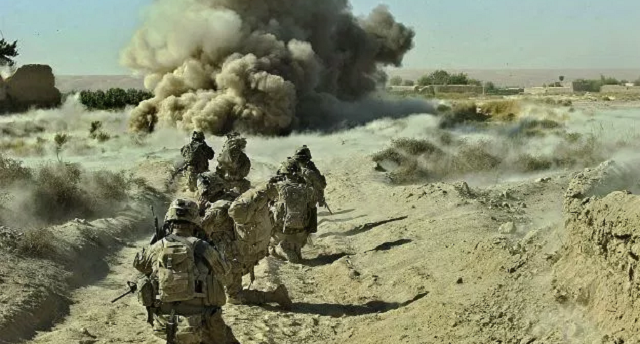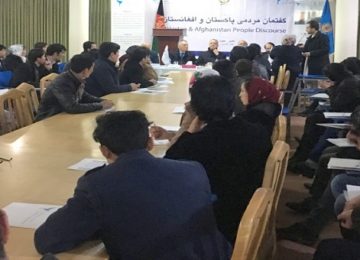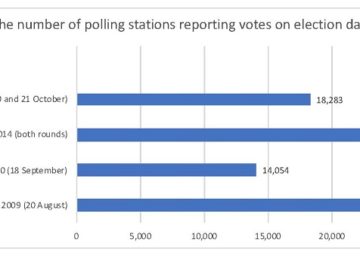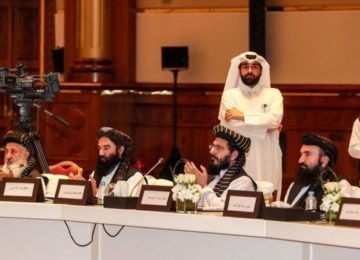March 15, 2019.
The US Senate recently introduced a legislation to end the 18-years-long war in Afghanistan. Called “American Forces Going Home After Nobel Service Act,” the bill has come at a time when the US is engaged in direct talks with the Taliban to work out an exit plan. The bill reads: “Within 45 days, a plan will be formulated for an orderly withdrawal and turnover of facilities to the Afghan government, while also settling a framework for political reconciliation to be implemented by Afghans in accordance with the Afghan constitution.”
Senator Rand Paul, one of the two architects of the bill, presented it saying: “The mission of punishing al Qaeda for orchestrating the 9/11 attack in the US has been achieved and the time has come to end the long-running war.” Giving the cost benefit analysis of the war, Paul said that the US had lost 2,300 service men, 20,000 were left wounded, the current war expense runs at over $ 51 billion and to date the war has cost the US $ 2 trillion. Since the senator had nothing to fill in the benefit side of the analysis, he had to by compulsion dwell on the negatives. In a video message posted before presenting the bill Paul had said: “Hundreds of millions of US taxpayers’ dollars have gone waste on rebuilding projects.” Groaning further he said: “We have spent $ 43 million on a natural gas station, even though no one has a car that runs on natural gas in Afghanistan, and $ 210 million went to build a new Afghan government building.” Then he inquired: “My question is: when are they [Afghans] going to pay for their own stuff? The list is ongoing and incredibly insulting to American taxpayers. It’s time to declare our mission over and our war won. Its time to build here, not there.”
What Paul has pointed at now had been told to the US many years back, with a forewarning that Afghanistan was not a winnable bet, not at least in the way the US had designed it. Afghanistan was not so much about spending resources as it was about creating an environment of congeniality absent in the Afghan political culture. The US instead of strengthening Afghanistan politically, supported crime syndicates and propped up a parallel power structure that worsened law and order in the country. The US Special Inspector-General for Afghanistan Reconstruction (SIGAR), John Sopko had explained this US behaviour in the following words:
“We went to bed with a lot of warlords, corrupt mafia figures and now we are stuck with them. We are identified with them. We are identified in essence with the bad guys with a lot of Afghans.”
The general impression recorded about Kabul in the international press has been of a capital which when not attacked by suicide bombers is in the hold of a gun-toting crime syndicate protected by the elite and warlords.
In the research on the causes and reasons for corruption compiled by the World Bank, war provides a perfect environment for pervasive corruption because of weak administrative institutions, a broken legal and judicial system, ineffective prosecution and the incapacity of the state to discourage corrupt behaviour. The report published by Transparency International in late January 2019 proved the World Bank right by stating that Afghanistan is the most corrupt country on earth having ranked 172 out of 180 countries in the Corruption Perception Index. Another survey by the Asian Foundation found that 81.5 percent of the Afghan population considers corruption one of the “major problems” of their country.
Going by the World Bank’s definition of a war economy, all the resources that the US claimed to have spent in the so-called state building in Afghanistan were actually squandered on projects that had no bearing on its political, economic or legal system. The SIGAR report presented to the US Congress further reinforced this fact. Sopko had narrated that the aid money was spent on medical clinics without doctors and water, on schools without children, and buildings that literally washed away in rain. Audit revealed funds paid to bureaucrats, soldiers and police that never existed.
In due course, when Afghanistan became increasingly unmanageable and dangerous, the western donor countries along with the countries engaged in a combatant role made a trust fund to pool their aid dollars. The World Bank, UN and NATO were to manage the trust. These big names, however, failed in their attempt to manage the money meant for the welfare of Afghans. “Our findings are that basically the World Bank did not know how the money was being spent and…even the Afghans were saying some of the programs were really stupid, but there was no way to stop them,” said Sopko. In another comment on the issue Sopko said, “His office had found a troubling lack of financial oversight and far-reaching mismanagement of two Western trust funds – the World Bank’s Afghanistan Reconstruction Trust Fund and the United Nations-administered Law and Order Trust Fund for Afghanistan used to train and equip Afghan security forces.”
Notwithstanding Senator Paul’s number crunching about the US losses in the Afghan war, both in term of casualties and squandered funds, he failed to spare a single word for the sufferings of Afghans. This is a reminder of the uncomfortable truth that the reconstruction project of Afghanistan lacked a ‘human face’. After ousting the Taliban in the first few months of the invasion and later installing a new government under the new Afghan Constitution, the US failed to understand that its role had now changed. The challenge at hand was not insurgency, but a corrupt and incompetent governance structure. The US policy on Afghanistan did not feature any plan to tame ethnic rivalries, undercut warlords, pick local leaders, build a justice system embedded in local norms that would have given people a reason to oppose the Taliban. To play out these strategies, politics, and not a war-induced mentality was required, which was absent.
Every passing year has added new losses to the war. The year 2018, according to the UN Assistance Mission Annual Report, was the deadliest year since the mission began tallying figures in 2009. The report recorded 4,000 civilian deaths in a single year, of which 63 percent were the result of attacks by different insurgent groups, and only 24 percent due to government and US actions.
The US has been trying to dump the wages of its failure in Afghanistan on Pakistan. But Pakistan has successfully countered the US design by sticking to the policy of seeing an Afghan-led and Afghan-owned solution to the war. However, given the ethnic fault lines and a political structure lacking ownership locally, a regional consensus among China, Russia, Iran and the Central Asian states against terrorism is indispensable.
It is this consolidation of consensus that will be the real test of Pakistan and the regional partners to build peace in South Asia.








